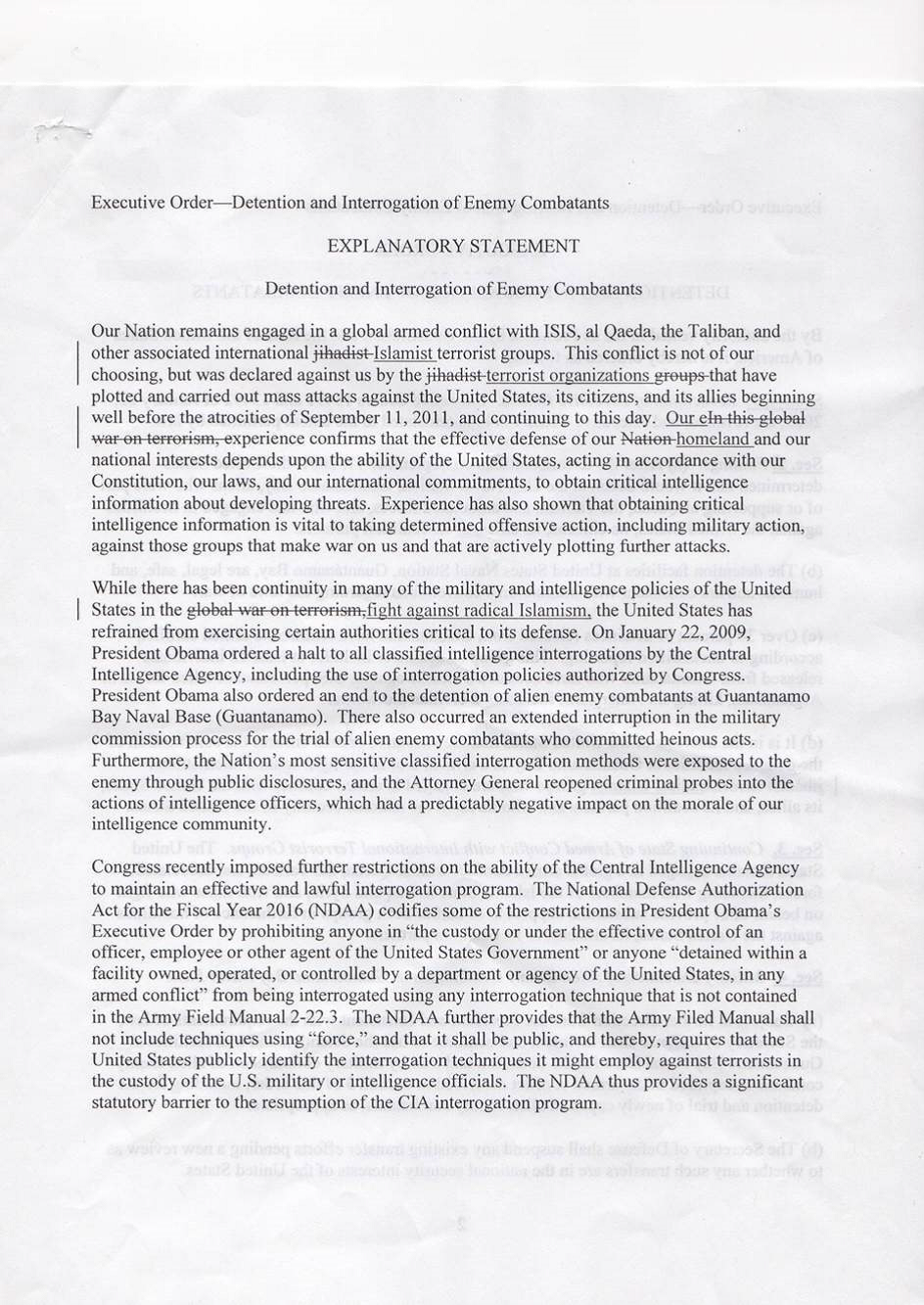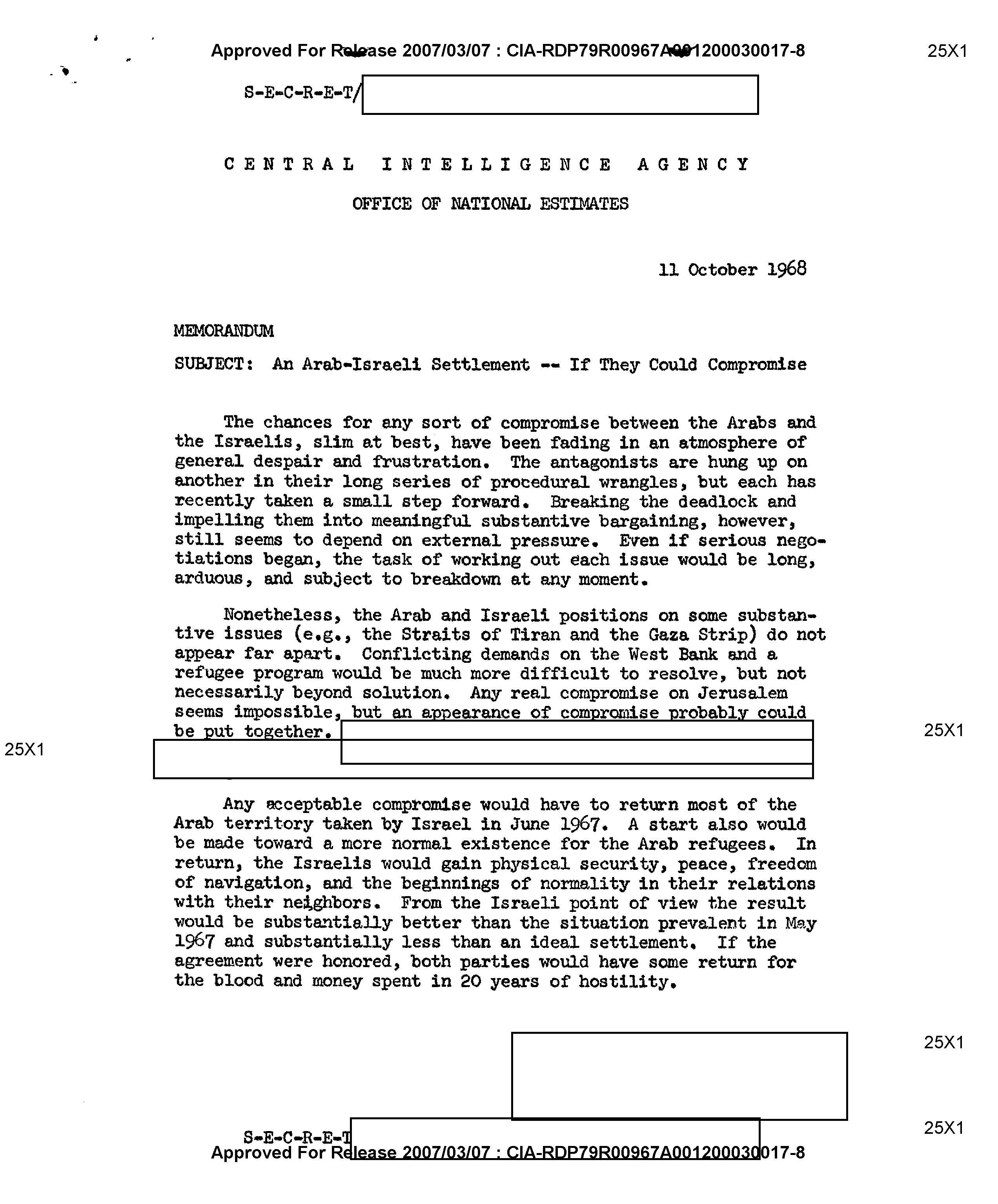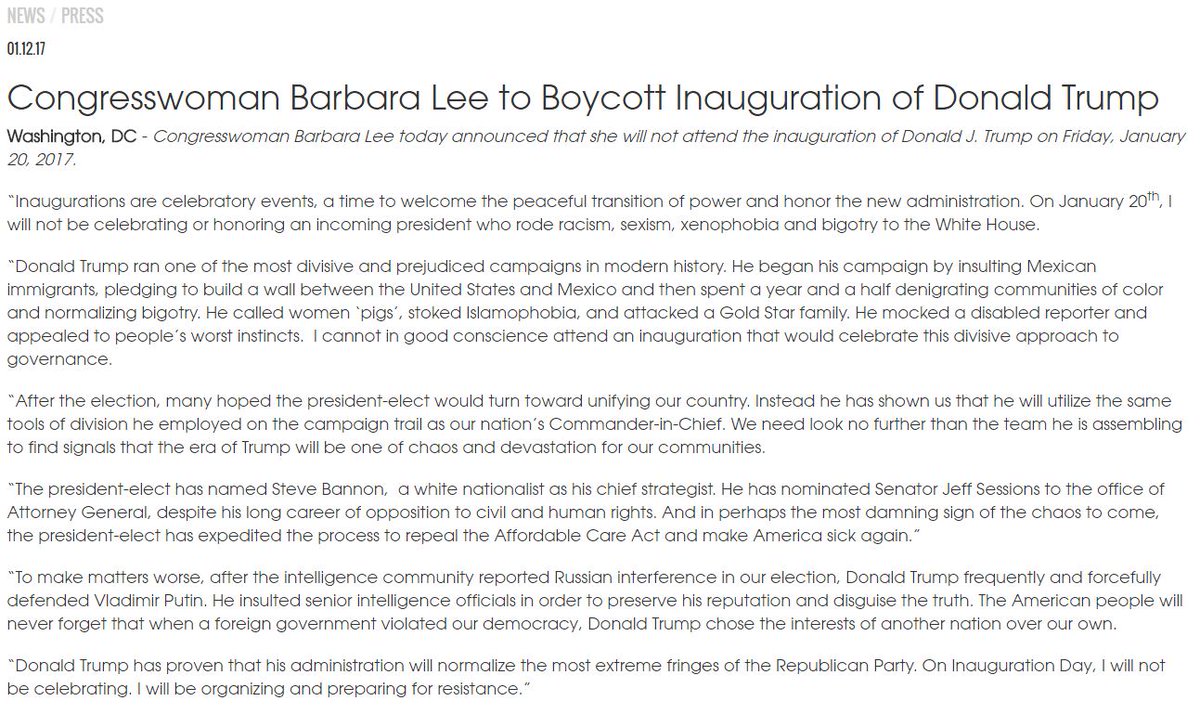 A Black Site is one thing, Interrogations another, but applications of enhanced interrogation methods, yet a third…
A Black Site is one thing, Interrogations another, but applications of enhanced interrogation methods, yet a third…
The Washington Post reports they are in possession of an early draft copy of an executive order to review the black site(s) program for captured terrorists. Under Barack Obama, terrorists were rarely if ever sought for detention and interrogated but rather, Obama ordered escalated use of drone strikes.
Trump Review CIA Black Sites (full document here)
***
Reuters/WaPo: U.S. President Donald Trump is expected to order a review that could lead to bringing back a CIA program for holding terrorism suspects in secret overseas “black site” prisons where interrogation techniques often condemned as torture were used, two U.S. officials said on Wednesday.
The black sites were used to detain suspects captured in President George W. Bush’s “war on terrorism” after the Sept. 11, 2001 attacks and were formally closed by former President Barack Obama.
Any return to the Bush administration’s initial anti-terrorism tactics – including secret prisons and interrogation methods considered torture under international law – would likely alienate key U.S. allies in the fight against militant groups like al Qaeda and Islamic State.
Aides to Obama said during his tenure that his prohibition against torture and efforts to close the Guantanamo prison in Cuba helped increase counterterrorism cooperation from U.S. allies in the Arab world.
The now-defunct program’s practices dubbed enhanced interrogation techniques, which included simulated drowning known as waterboarding, were criticized around the world and denounced by Obama and other senior U.S. officials as torture.
The officials said Trump is expected to sign an executive order in the next few days. It would call for a high-level review into “whether to reinitiate a program of interrogation of high-value alien terrorists to be operated outside the United States” and whether the CIA should run the facilities,” according to a copy of the draft published by the Washington Post.
The document ignited a bipartisan outcry in Congress. Many people in U.S. intelligence agencies and within the military are opposed to reopening the harsh interrogation program, according to multiple serving officers.
“The President can sign whatever executive orders he likes. But the law is the law. We are not bringing back torture in the United States of America,” Senator John McCain, a Republican who underwent torture as a prisoner of war in Vietnam, said in a statement.
Trump administration spokesman Sean Spicer said the draft was not a White House document. The draft published by the Washington Post appeared to have sections missing, suggesting that it may not have been a full version ready for Trump to sign.
The CIA black sites were located in Poland, Lithuania, Romania, Thailand and Afghanistan.
Asked whether he wants waterboarding as president, Trump answered in an interview with ABC News:
“I will rely on (CIA director Mike) Pompeo and (Defense Secretary James) Mattis and my group. And if they don’t want to do it, that’s fine. If they do want to do it, then I will work toward that end,” Trump said.
“I want to do everything within the bounds of what we’re allowed to do if it’s legal. If they don’t want to do it, that’s fine. Do I feel it works? Absolutely I feel it works.”
Mattis and Pompeo had not been aware such plans were in the works, according to a congressional source.
KEEP GUANTANAMO OPEN
Trump’s draft order would authorize a review of interrogation techniques that U.S. officials could use on terrorism suspects, keep open the detention center at the U.S. naval base in Guantanamo Bay, Cuba and send new prisoners there.
Trump’s draft also revokes directives by Obama to grant the International Committee of the Red Cross access to all detainees in U.S. custody and restrict interrogation methods to those in a U.S. Army field manual.
Trump vowed during the 2016 election campaign to resume waterboarding and a “hell of a lot worse” because even if torture does not work, “they deserve it anyway.”
He has also said that he wanted to keep Guantanamo open and “load it up with some bad dudes.”
Of the 41 prisoners left at Guantanamo, 10 face charges in war-crimes proceedings known as military commissions, including Khalid Sheikh Mohammed, accused mastermind of the Sept. 11, 2001, attacks, and his alleged co-conspirators. Bush established the military commissions, which Obama later changed.
The draft order said that, “No person in the custody of the United States shall at any time be subjected to torture, or cruel, inhuman or degrading treatment or punishment, as proscribed by U.S. law.” It does not mention international laws to which the United States is a signatory that prohibit torture.
Congress passed the National Defense Authorization Act in 2015, which reaffirmed a prohibition on torture and required U.S. interrogators to adhere to techniques in the Army field manual.
However, the Justice Department under Trump could issue an interpretation of U.S. law that allows for the use of harsh interrogation techniques as occurred in the so-called “torture memos” drafted under the Bush administration in 2002 and subsequently withdrawn.
Despite the killing of al Qaeda leader Osama bin Laden during Obama’s presidency, the dramatic spread of groups like Islamic State has exacerbated the threat from violent Islamist organizations.
In a statement accompanying the draft order, the administration criticizes Obama’s policies, saying, “The United States has refrained from exercising certain authorities critical to its defense.” But it acknowledges that the National Defense Authorization Act “provides a significant statutory barrier to the resumption of the CIA interrogation program”.
“WORRISOME”
Human rights groups decried any attempt to bring back the black sites.
“This is an extremely disturbing and outrageous attempt to open the door again to systematic torture and secret detention. This is the Trump administration making good on its most worrisome comments during the campaign,” said Naureen Shah, Amnesty International USA’s director of national security and human rights.
Critics say a return to harsh interrogations would enflame tensions in Muslim countries and be counterproductive.
In the draft document, references to the “global war on terrorism” were edited and replaced with the phrase “fight against radical Islamism,” reflecting language Trump often uses.
A former senior U.S. intelligence official, who requested anonymity, said many CIA officers would oppose reinstatement of “black site” interrogations, in part because they were forced to obtain lawyers after the withdrawal of the Justice Department memos that legalized the harsh techniques.
“People felt they were hung out to dry,” the former official said. “There is a lack of trust there.”
Moreover, he said, it would be extremely difficult to persuade other governments to allow the CIA to establish secret prisons on their soil.
“Where are you going to do this?” he asked. “How many countries are going to jump back into the U.S. lap?
Trump’s order, if enacted, could put new CIA Director Pompeo in a tight spot given that his workforce, according to multiple serving officers, largely opposes reinstating the “black sites” program. It could also complicate the confirmation of Trump’s nominee for the job of director of national intelligence, former U.S. senator Dan Coats.
As a conservative Republican congressman from Kansas, Pompeo defended the CIA’s use of harsh interrogation techniques, arguing that they produced useful intelligence.
During his confirmation hearing for CIA director, he pledged he would “absolutely not” reinstate those methods. Yet in written responses to questions from Senate Intelligence Committee members, he appeared to leave the door open to restoring them.
“If experts believed the current law was an impediment to gathering vital intelligence to protect the country, I would want to understand such impediments and whether any recommendations were appropriate for changing current law,” Pompeo wrote.
(Writing by Yara Bayoumy; Additional reporting by Warren Strobel, Matt Spetalnick and Patricia Zengerle; Editing by Alistair Bell and Jonathan Oatis)


